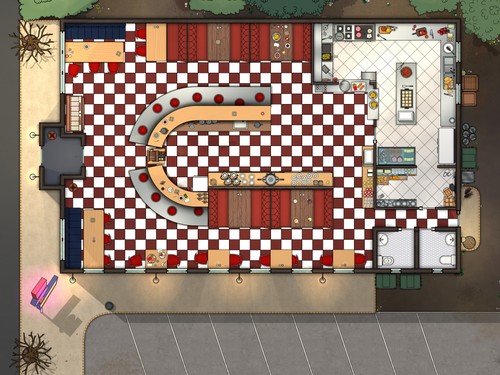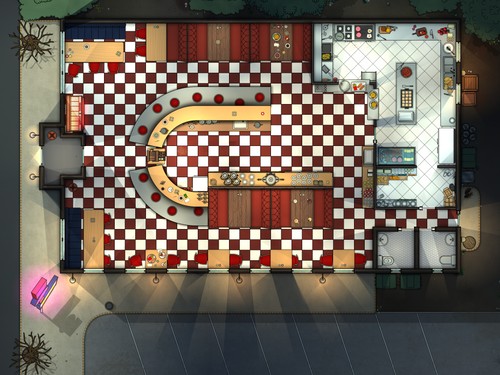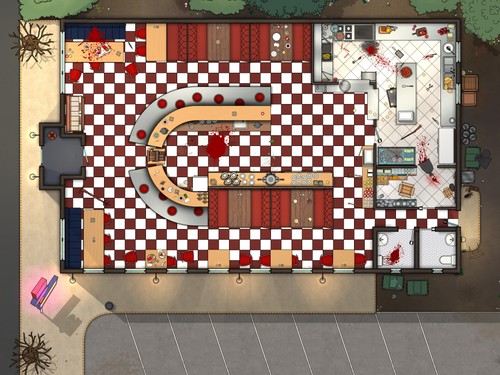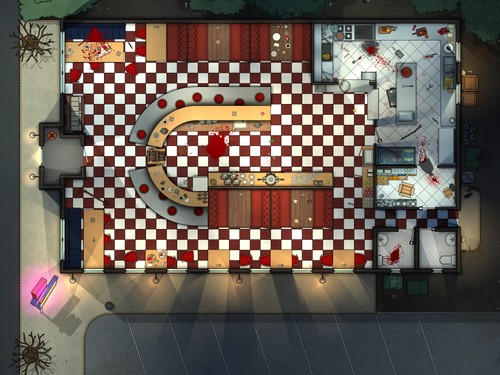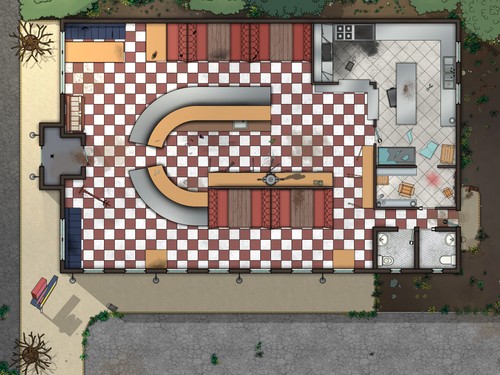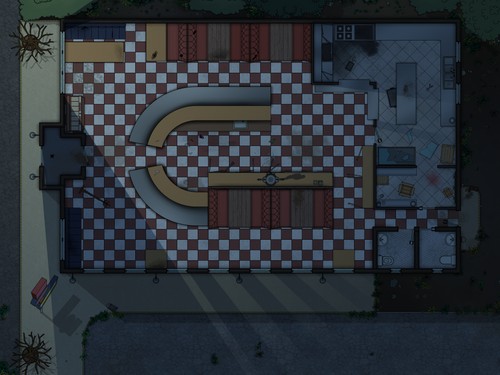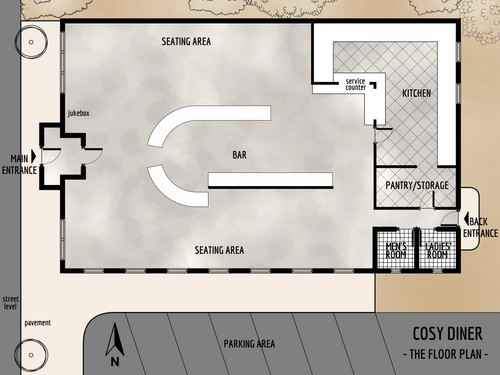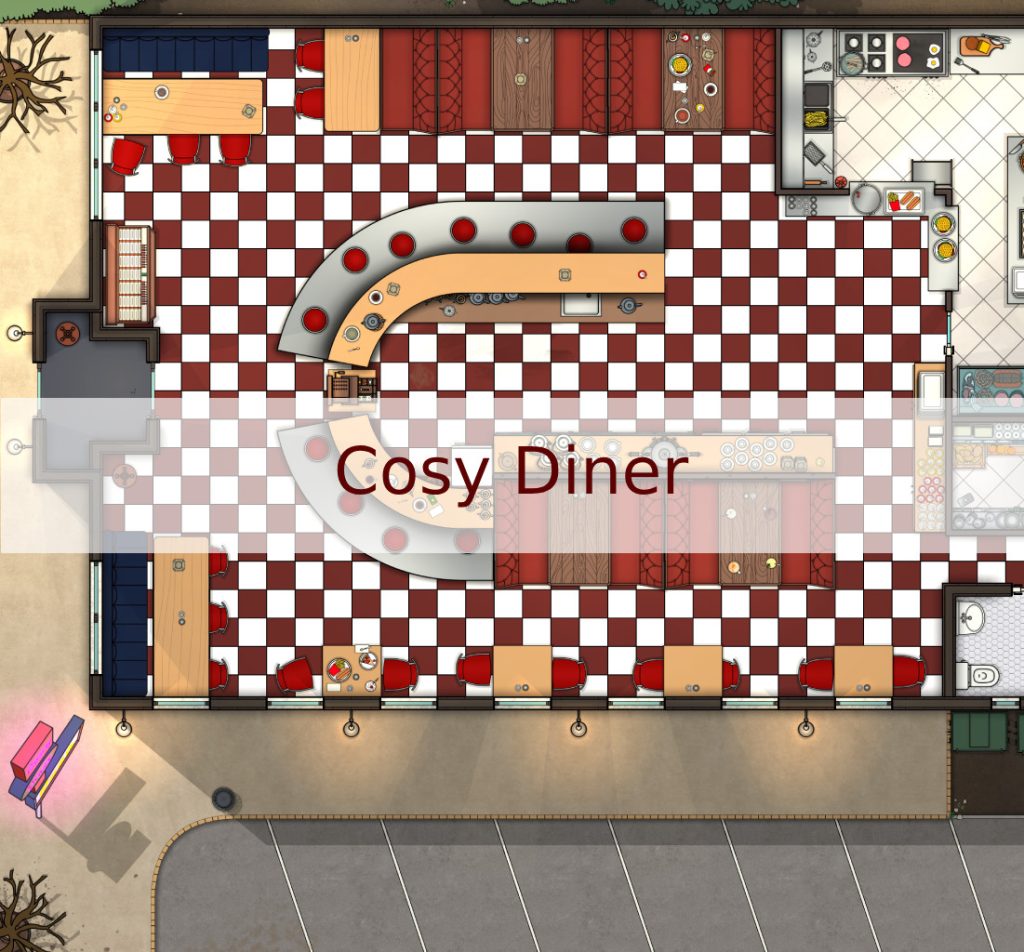Why do the vinyl booths hum in perfect pitch? What's causing those endless reflections in the chrome fixtures? How do coffee cups always end up half-full no matter how much is drunk? What makes the neon sign flash in binary code after midnight, and why do the checkerboard floor tiles rearrange into different patterns between customers?
Follow Cthulhu Architect on BlueSky!There’s a safety in thinking in a diner. You can have your coffee or your milk shake, and you can go off into strange dark areas, and always come back to the safety of the diner.
― David Lynch
The neon sign flickered “Cosy Diner – Open 24 Hours” in cheerful pink letters, casting a warm glow over the empty highway. Detective Ray Morrison pulled into the gravel parking lot at 2:33 AM, grateful to find somewhere open after driving through three hours of nothing but cornfields and darkness.
The diner looked like something from a Norman Rockwell painting—red vinyl booths, checkered floor tiles, and a long counter with spinning stools. Bell chimes announced his arrival as he pushed through the glass door, and the smell of coffee and apple pie made his stomach growl.
“Welcome to Cosy Diner, honey!” called the waitress from behind the counter. She was middle-aged with graying hair in a neat bun, wearing a pink uniform and a name tag that read “Dolores.” Her smile was radiant. “Sit anywhere you like. Coffee?”
Ray slid into a corner booth, noting he was the only customer. “Please. Black.”
The coffee was perfect—rich and hot, exactly what he needed. The menu was laminated and cheerfully illustrated with pictures of hamburgers and milkshakes. Everything looked delicious and reasonably priced.
“What can I get you, sweetheart?” Dolores appeared with a steaming pot, refilling his cup before he’d even asked.
“The meatloaf special sounds good.”
“Oh, you’ll love it. Been making that recipe here for thirty years. Coming right up!”
Ray pulled out his phone to check his messages, but there was no signal. Not unusual out here in the middle of nowhere. He settled back to wait, enjoying the cozy atmosphere. An old jukebox in the corner played gentle fifties tunes, and the kitchen sounds were comforting—sizzling, chopping, the occasional clatter of dishes.
The meatloaf arrived quickly, accompanied by mashed potatoes and green beans. It was exactly like his grandmother used to make, perfectly seasoned and tender. Ray cleaned his plate and accepted Dolores’s offer of apple pie.
“You traveling far?” she asked, leaning against his table with the coffee pot.
“Chicago. Work conference.”
“Oh, that’s nice. We don’t get many folks through here anymore since they built the interstate. But we keep the lights on for travelers like you.”
The pie was extraordinary—flaky crust, sweet apples with just the right amount of cinnamon. Ray felt wonderfully full and content. The warmth of the diner was making him drowsy, but he needed to get back on the road.
“What do I owe you?” he asked, reaching for his wallet.
“Oh, don’t worry about that now,” Dolores said with her bright smile. “You just relax. You look tired, honey.”
Ray’s eyelids were growing heavy. The gentle music and warm lighting made everything feel dreamy, surreal. He blinked hard, trying to focus.
“I should really get going…”
“In a minute, dear. Just rest your eyes.”
When Ray woke up, pale morning light was filtering through the windows. He was still in the booth, but something was wrong. His neck ached from sleeping upright, and there was a strange taste in his mouth—metallic and bitter.
The diner looked different in daylight. The cheerful red vinyl was cracked and faded, the checkered tiles were missing in places, and everything had a layer of dust. The jukebox was silent and dark.
“Dolores?” he called out, but his voice echoed in the empty space.
Ray stood on unsteady legs and walked to the counter. The coffee pot was cold, with a film of mold floating on top. The kitchen beyond was dark and obviously hadn’t been used in years. Cobwebs stretched between the chairs, and mouse droppings littered the floor.
On the wall behind the register, yellowed newspaper clippings were tacked to a corkboard. Ray moved closer, his blood turning cold as he read the headlines:
“Cosy Diner Owner Dies in Kitchen Fire – 1987”
“Local Eatery Closes After Tragic Accident”
“Highway Deaths Continue on Cursed Stretch of Route 9”
There were photos too—dozens of missing person flyers, all featuring people who’d disappeared on this stretch of highway over the past thirty-five years. In the corner, almost hidden, was a small article: “Waitress Dolores Klein Found Dead in Diner Ruins – Apparent Suicide Following Owner’s Death.”
Ray’s hands shook as he searched his pockets. His wallet was gone. His car keys were gone. His phone was dead, the battery completely drained despite being nearly full when he’d arrived.
He stumbled outside to find his car, but the parking lot was empty except for rusted hulks of vehicles half-buried in weeds—dozens of them, stretching back into the field. Different makes and models from different decades, all abandoned and slowly being reclaimed by nature.
Ray ran to the road, but in both directions, the asphalt was broken and overgrown. No fresh tire tracks, no signs that anyone had driven this way in years.
As the sun climbed higher, he could see the truth. The diner was a burned-out shell, its roof collapsed, its windows black and empty. The neon sign lay shattered in the weeds.
But as evening approached and shadows lengthened, the building began to shimmer and change. The walls straightened, the lights flickered on, the warm glow returned. Ray could smell coffee brewing and hear the gentle chimes of the door.
“Welcome back, honey!” Dolores called from inside, her smile as bright as ever. “Ready for dinner?”
Ray tried to run, but his feet carried him toward the door. The hunger was overwhelming now, and the diner looked so warm and inviting. So cozy.
Just like home.
